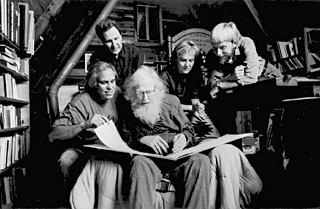This year celebrates the centenary of William Everson’s
birth. Everson was a California poet and he is the man that taught us to love
and how to print fine press books.
 |
| Everson surrounded by Santa Cruz printers in a photo taken only a few years before he died |
Everson had several distinct phases of his
literary life. He grew up in Selma, in California’s Central Valley and began
writing poetry while in High School. He found his literary voice reading
Robinson Jeffers’ poetry while studying at Fresno State. He quit college and
went “back to the land,” becoming a Central Valley farmer. That calling was cut
short by WW2 when he was drafted and then sent as a Conscientious Objector to a
work camp in Oregon. There he met several San Francisco poets and after being
released from the camp moved to San Francisco to become a “Beat Poet.” He
acquired a Washington handpress and proceeded to print and bind two books of
his own poetry. In the mid-1950s he had a religious conversion experience,
joined the Dominican Order and changed his name to Brother Antoninus. He
continued to write poetry, give readings and print books, and became widely
known as the “Beat Friar.” In the early 70s he fell in love with a woman he had
been counseling and in a dramatic moment at a poetry reading he stripped off
his monk’s robes announcing he was leaving the order to live “in sin.” It was
now no longer a beat, but rather a peace, love and rock and roll kind of world
and he began to write “earth poetry.” It was at this time, dressed as a
mountain man in buckskin and bear claws, that he began to teach at the
University of California at Santa Cruz while at the same time printing “fine
press” books for the University’s Lime Kiln Press.
The day we left home for this current wandering book
artists’ trip, which was back in September, we finished a project we had been
working on since 2009, an edition of William Everson's poem, “The Alder.” Our
book is designed to do homage to his groundbreaking edition of “Granite and
Cypress.” (you can see some images on our website at: http://www2.cruzio.com/~peteranddonna/2-Alder.htm).
Our book has an introduction written by Allan Campo, an
Everson scholar. He lives in Asheville and so when we passed through the town
we set up an appointment to meet with him and his wife Nancy to show them the
finished book.
But the reason I say Asheville
became Eversonesque for us is this: the same evening we had dinner with an
Asheville artist named Laura Lago.
 |
| Laura (on left) in her tobacco barn |
Laura had taken a class I taught at the San Francisco Center for the Book. That class was titled “Fine Press Printing and The West Coast Fine Press aesthetic of the 1950s-70s.” Here is the class description:
“Learn the fine points of fine press printing. In this class you will study
examples of books printed by mid-twentieth century west coast fine press
printers including William Everson, the Allens, Grabhorns and others. You will
then handset type, damp paper and use a Vandercook proof press to print a one
page poem on a folio sheet of Peter’s handmade paper. Peter will explain the
fine press aesthetics of page layout and type setting as he learned it from
William Everson at the Lime Kiln Press in the 1970s. You will learn how to
impose the type in the bed of the press, how to damp paper and how to achieve
perfect registration and presswork.”
In that class we made a book,
titled “Excerpts” with quotes by Everson on the book as an art work (you can
see it on our web site at http://www2.cruzio.com/~peteranddonna/2-Excerpts.htm). Laura cut the images for that book, and she did it
so they would look very much like the images that Rose cut for Everson’s first
two books, “A Privacy of Speech” and “Triptych for the Living.”
It was nice, if only for a
short moment, to once again feel a good strong connection to my printing mentor. Everson
was the one who set me on the path to being a book artist. He encouraged all
his students to find quality content and strive for perfection in workmanship.
Mentors are important. And as we travel on this trip we try to be mentors of
sorts, encouraging the people we meet to explore the possibilities of the book
arts, sharing our expertise and our passion for this new artistic medium, the
artists’ book.




No comments:
Post a Comment